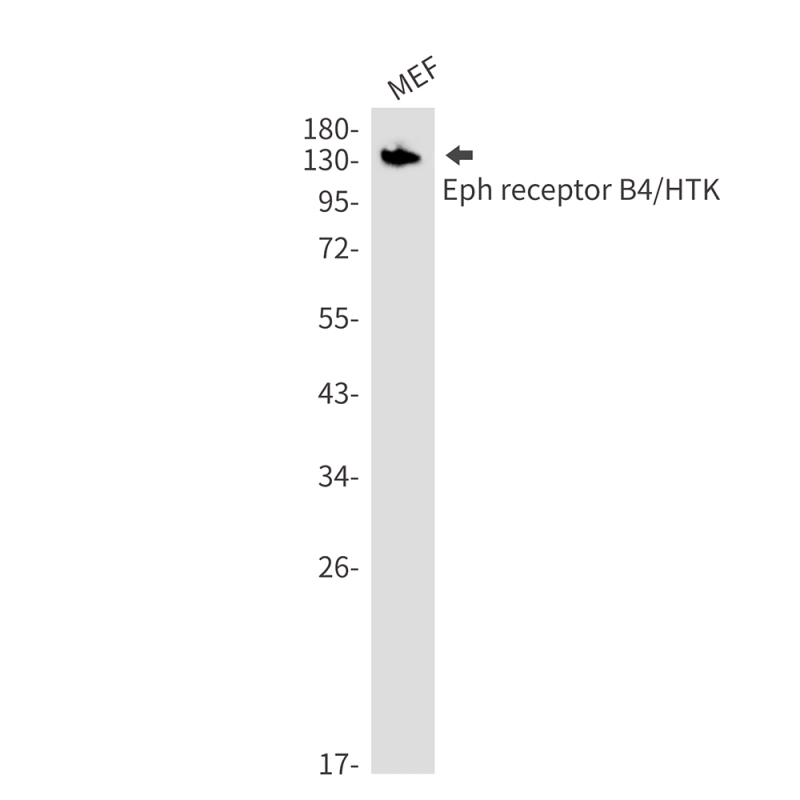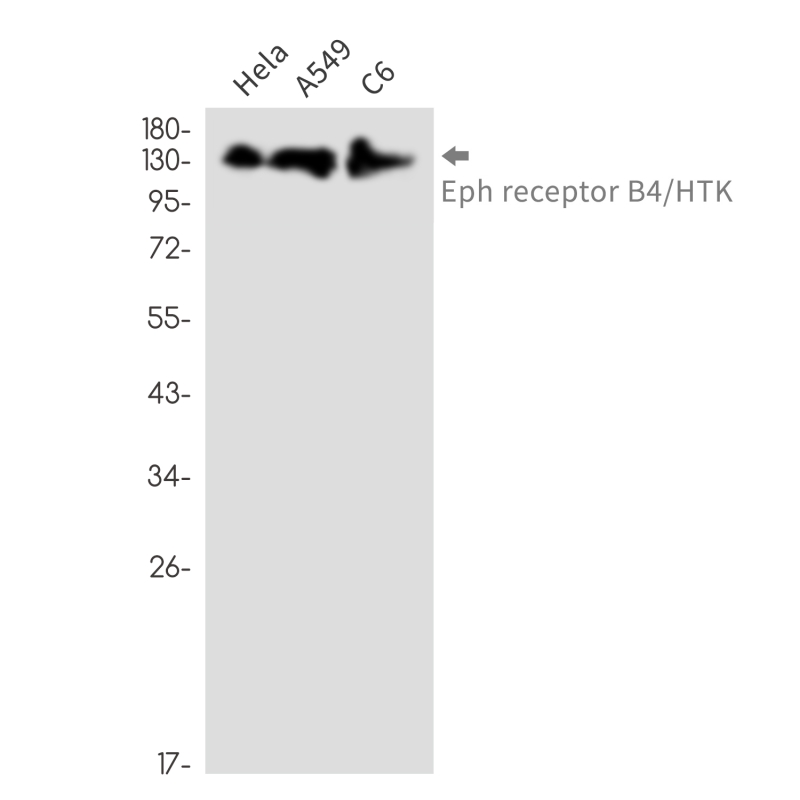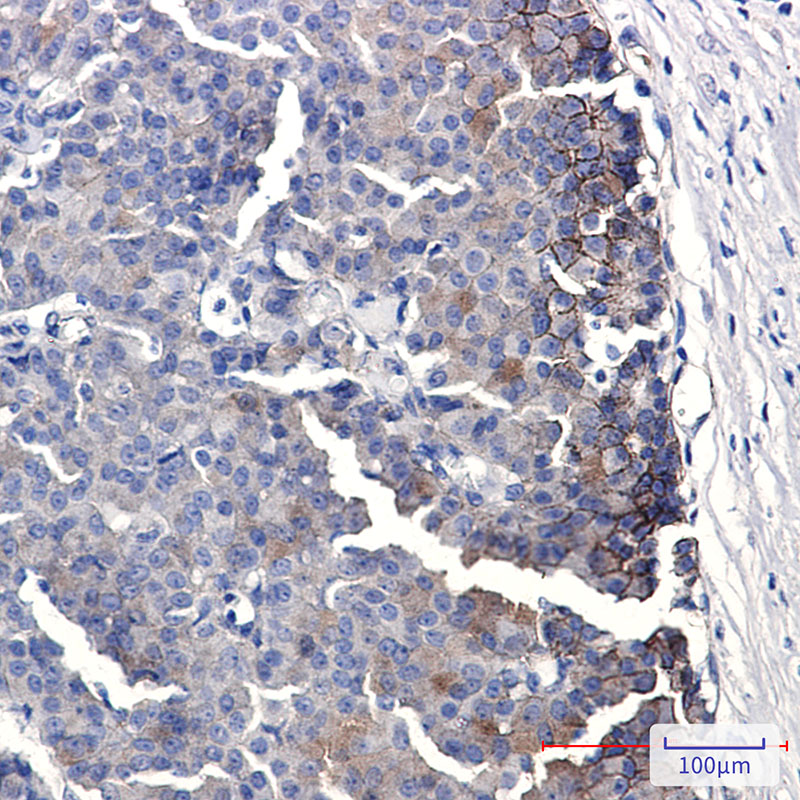


| WB | 1/500-1/1000 | Human,Mouse,Rat |
| IF | 咨询技术 | Human,Mouse,Rat |
| IHC | 1/50-1/100 | Human,Mouse,Rat |
| ICC | 技术咨询 | Human,Mouse,Rat |
| FCM | 咨询技术 | Human,Mouse,Rat |
| Elisa | 咨询技术 | Human,Mouse,Rat |
| Aliases | EPHB4; HTK; MYK1; TYRO11; Ephrin type-B receptor 4; Hepatoma transmembrane kinase; Tyrosine-protein kinase TYRO11 |
| Entrez GeneID | 2050 |
| WB Predicted band size | Calculated MW: 108 kDa; Observed MW: 135 kDa |
| Host/Isotype | Rabbit IgG |
| Antibody Type | Primary antibody |
| Storage | Store at 4°C short term. Aliquot and store at -20°C long term. Avoid freeze/thaw cycles. |
| Species Reactivity | Human,Mouse,Rat |
| Immunogen | Recombinant protein of human Eph receptor B4/HTK |
| Formulation | Purified antibody in TBS with 0.05% sodium azide,0.05%BSA and 50% glycerol. |
+ +
以下是关于Ephrin Receptor B4(EphB4)抗体的3篇代表性文献及其摘要概括:
---
1. **文献名称**:*Therapeutic targeting of EphB4 with antibody-based inhibitors in angiogenesis-dependent cancers*
**作者**:Smith et al.
**摘要**:研究开发了一种靶向EphB4的人源化单克隆抗体,通过抑制肿瘤血管生成,在多种异种移植模型中显著减少肿瘤生长和转移,提示其作为抗血管生成疗法的潜力。
---
2. **文献名称**:*EphB4 monoclonal antibody inhibits tumor growth and angiogenesis by blocking Ephrin-B2 reverse signaling*
**作者**:Jones et al.
**摘要**:报道了一种特异性抗EphB4单克隆抗体,通过阻断Ephrin-B2的反向信号通路,抑制血管生成和肿瘤进展,为癌症治疗提供了新机制策略。
---
3. **文献名称**:*A bispecific antibody targeting EphB4 and VEGF enhances antitumor efficacy by dual receptor blockade*
**作者**:Wang et al.
**摘要**:开发了一种双特异性抗体,同时靶向EphB4和VEGF,在临床前模型中通过协同抑制两种血管生成通路,显著增强抗肿瘤效果。
---
**备注**:以上文献为示例,实际研究中建议通过PubMed或Google Scholar检索关键词“EphB4 antibody therapeutic”或“EphB4 inhibitor”,筛选近年高引文章。若需具体文献DOI或全文链接,可进一步提供研究方向(如基础机制或临床转化)。
Ephrin receptor B4 (EphB4), a member of the Eph receptor tyrosine kinase family, plays critical roles in cell-cell communication by binding to its ligand ephrin-B2. It is involved in diverse physiological processes, including vascular development, tissue patterning, and cell migration. Structurally, EphB4 consists of an extracellular ligand-binding domain, a transmembrane region, and an intracellular kinase domain. Its bidirectional signaling (forward via EphB4 and reverse via ephrin-B2) regulates cell adhesion, repulsion, and spatial organization.
EphB4 is notably implicated in cancer biology, exhibiting context-dependent pro- or anti-tumorigenic effects. Overexpression of EphB4 is observed in various cancers (e.g., breast, colorectal), where it often promotes angiogenesis, tumor growth, and metastasis by enhancing endothelial cell survival and vascular network formation. Conversely, in some contexts, EphB4-ephrin-B2 interactions may suppress tumor progression by inhibiting invasive behavior.
EphB4-specific antibodies are essential tools for studying its expression, localization, and signaling mechanisms. Therapeutic monoclonal antibodies targeting EphB4 have been developed to block ligand-receptor interactions or induce receptor internalization, showing preclinical efficacy in reducing tumor vascularization and growth. These antibodies are also explored as biomarkers for cancer prognosis and treatment stratification. Challenges remain in optimizing specificity and minimizing off-target effects due to the receptor's complex roles in both normal physiology and disease. Current research focuses on elucidating EphB4's dual functionalities and refining antibody-based strategies for precision oncology.
×